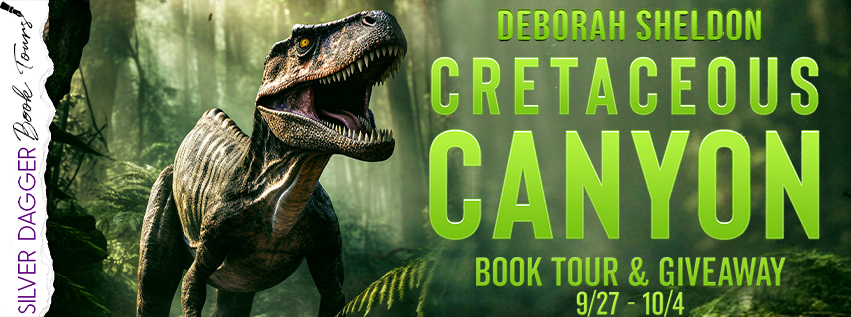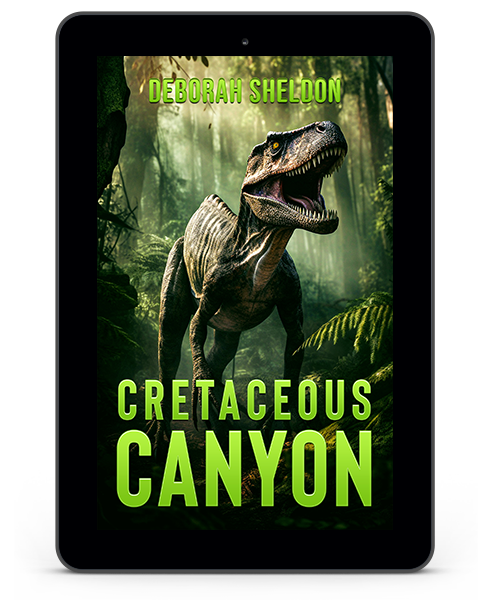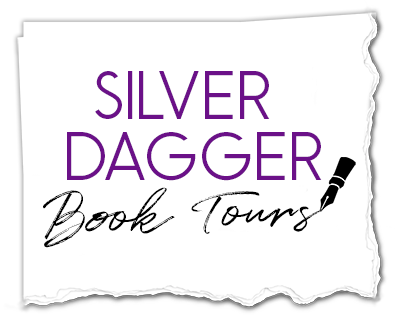.
A team on an expedition to explore a mysterious canyon in the Australian outback encounters Cretaceous-era dinosaurs.
.
Cretaceous Canyon
by Deborah Sheldon
Genre: Horror, Action, Adventure, Dinosaur Lost World
.
Australia’s outback hides a mysterious canyon. Hidden deep within is a forest of pine tree that dates from the Cretaceous Period. A megacorporation sends in a team of experts to research this canyon for botanical riches.
The expedition enters a no-man’s land formed 100 million years ago when Australia was still attached to Antarctica, and dinosaurs ruled the super-continent. But the canyon has more prehistoric and dangerous species than anyone could have possibly imagined.
Trapped and terrified, unarmed and unable to communicate topside, the team’s extraction deadline is six long hours away.
The frantic race for survival is on.
Interview with Author Deborah Sheldon
.
How long have you been writing?
My whole life; as far back as I can remember. In primary school, I loved superhero comics and wanted to be an illustrator for DC. I even made my own comics. Then I realised that writing the story rang my bell more than illustrating the panels.
When I was 11 years old, I knew I wanted to be a writer. At the time, I thought the only route was to be a novelist. My three years at university introduced me to a huge range of options that I hadn’t considered before, which fascinated me.
So, my next 20 years were spent penning magazine feature articles, TV scripts such as NEIGHBOURS, and non-fiction including books and medical/patient information. In 2005, at the age of 37, I wrote my first short story. Ever since, I’ve written fiction across the darker spectrum of crime, noir and horror.
Do you see writing as a career?
Most definitely. More than a career; a calling. I’ve been a professional writer across various media my entire adult life. This craft is my passion and a top priority, and that’s how I made it my career.
Do you read yourself and if so, what is your favorite genre?
I read widely across genres and eras. Generally, I’m most invested in any genre of fiction from the early 1800s onwards to the present day, though I also find non-fiction interesting. What I read at any given time depends on how I’m feeling. Books are like food to me; I do have favourites, but occasionally I’m in the mood for something new or unusual.
A day in the life of an author?
I always begin a writing day by editing my pages from the previous session. When I’m finished editing after an hour or so, I’m immersed in the story. Picking up where I left off feels easy. After four or five hours of writing, I’m usually done for the day. My brain feels flattened and I need time to ‘decompress’.
Advice for new writers?
Research your market thoroughly, and submit your work to appropriate markets only.
Back in the old days, when the Internet was just a twinkle in the eyes of various computer scientists, it took legwork to research a market. For example, if you wanted to pitch a feature article to a magazine, you’d have to get your hands on a physical issue to read it. If you wanted to pitch a novel, you’d have to spend a few hours in a brick-and-mortar bookshop browsing the shelves to get the feel of a publisher’s submission requirements. I used to buy market annuals, which provided brief summaries and contact details.
Today, market research is a breeze! Publishing houses have websites and most offer free samples. Many titles on Amazon have the ‘look inside’ feature where you can read the first couple of chapters, which helps you get a feel for a publishing house’s proclivities. Everything you need to know is a mouse-click away.
But the most important tip when researching markets is follow the submission guidelines, no matter how fussy and particular they may seem. Editors and slush pile readers, with their massive amounts of required reading, have no interest in indulging your quirks. Present your manuscript in the exact manner requested, or risk editors hitting ‘delete’ without reading it.
Describe your writing style.
Cinematic, spare, direct.
What are you currently reading?
I have three books on my bedside table: Collected Ghost Stories by M.R. James (reading for the second time); Welcome to the Monkey House by Kurt Vonnegut; and the crime anthology Illicit Motions edited by Eddie Generous (in which I have a story, “Fork in the Road”).
What is your writing process? For instance, do you do an outline first?
Outlining is my habit. It comes from writing feature articles and TV scripts, which have fixed formats. You can’t deviate. If you do, you risk getting rejected or fired. For example: if you promise a magazine editor an article of 5000 words, you’d better deliver that within a very small margin; and if you pen a half-hour TV script, you’d better write 21 minutes around equally-spaced ad breaks.
So, from the get-go of my fiction writing career, I’ve always outlined before writing a word. I still do that to this day. Writing an outline lets me pin down a story so that I can get my first draft onto paper. I use brief outlines of perhaps a line or two per plot-point.
If freestyling instead, an idea might lead me around in pointless circles until I lose heart and give up.
READER REVIEWS
Robyn O’Sullivan (Goodreads) 5/5 stars – This book is a gut-wrenching, roller-coaster ride through six hours of time, ripping the reader every which way through emotional and physical upheavals that suddenly crash-land, leaving a sense of “Wow! What the hell just happened?”.
Steve Paulsen (Goodreads) 5/5 stars – Unputdownable! A non-stop, page-turning, visceral, heart-pounding thriller. Highly recommended!
.
Enjoy this peek inside:
.
The hiss of the opening door drew everyone’s attention.
Good Christ! Alastair jumped to his feet.
It was Raj Devi himself, wandering into the conference room like a lost and befuddled grandfather, wearing slacks and a giant knitted cardigan. His hair and beard were salt-and-pepper, his seventy-two-year-old face frowning with its usual look of perpetual distraction.
Alastair raced towards the door and took its weight.
“Mr Devi!” he gasped, clumsily grasping his boss’s elbow. “What are you doing here?”
The old man glanced up, his gaze as sharp as darts, and whispered, “Rallying the troops.”
“Let me help you to a chair—”
“Thank you, I already know how to sit in a chair,” Raj said, and this time he lifted his voice, rolling it around the conference room, a deep and rich example of Received Pronunciation English, a baritone fit for the Shakespearean stage.
Alastair saw the effect on his recce team: everyone sat up straight. If he could figure out Raj Devi’s effortless ability to command an audience, then Alastair would rule the world.
“Everyone, pay attention,” Alastair said, his voice in comparison like a squeak to his own ears. “This is Raj Devi, your sponsor. You’re in the presence of a great man.”
Raj took Alastair’s chair and gazed around the table. No one rushed him. No one looked impatient. The silence was still and complete. He held them all in the palm of his hand, and Alastair both idolised Raj and hated him for this charisma, this absolute magnetism. Alastair had to remain standing, which was awkward, but the time for sitting was now lost.
With a half-smile, Raj nodded sagely. “I’m a believer in our power to make a better world,” he said, and the timbre of his voice sounded hypnotic; even Gloria was in thrall. “So, if you’ll indulge me, I’d like to tell you a story. A story about seeds. Leaves. Bark. Fruit. The human race has used plants to make medicines since before written language was invented. Traditional medicines date back thousands of years to Egyptian scrolls, Indian clay tablets, Chinese inscriptions etched on seashells and across the dried bones of oxen. Today, one in ten of our essential modern medicines is based on flowering plants. One in ten! My word.”
Lapsing into silence, Raj linked his fingers together on the table and closed his eyes. The seconds ticked on. Alastair checked the faces of his team and felt that he must say something, had to say something, or risk losing them. But what? God, the empty seconds kept ticking…
Alastair said, “Not just medicines! No, the plants we find today could also make new pesticides, and help farmers to breed disease-resistant crops—”
“All of us,” Raj Devi interrupted in his sonorous tone, “has taken a painkiller as simple as the aspirin. That miracle medicine was derived from the willow tree, its properties discovered by ancient Egyptians and other peoples such as Native Americans. Morphine is from the poppy. Today, plants help treat Parkinson’s Disease, diabetes, various cancers, heart disease, other ailments. Your work today could very well discover unknown plants that may herald a new age of medicine. Imagine, a cure for Alzheimer’s! It might be waiting for you, out there in that canyon. Waiting for all of us, the entire human race. Your hike has the potential to change the world, and save countless lives for generations to come. Oh, my goodness. What a legacy.”
The silence in the room was absolute. Alastair became aware that he was holding his breath. The team members appeared transfixed, mesmerised by the old man.
“Thank you,” Raj sighed. “Thank you for striving to help me make a better world.” He pushed out his chair, stood up, went to leave and then hesitated. “Please,” he added, “eat as much of the breakfast buffet as you can. It cost me a small fortune!”
He laughed and everyone joined in. Like Pavlov’s dogs to a bell, they automatically reached for Danish pastries, croissants, donuts, muffins, goat cheese tarts, fruit skewers.
Alastair stopped Raj at the door. The old man glanced up at him, cold and annoyed.
Taken aback, Alastair found himself stammering. “Gosh, sir, that was a…that was a…”
“What?”
“Such a terrific, inspiring speech—”
“I don’t take notes.”
“Oh, I didn’t mean—”
“Focus on the hike. Don’t fuck it up,” Raj said, and put his hand on the door.
“I’ve put together a competent team,” Alastair said, striving to appear confident. “I’m just wondering if you think it’s absolutely necessary that I go with them into the canyon.”
Raj gave a frosty smile. “Hmm. I don’t know. Do you think you’re necessary?”
“Well, yes, in the creation of the team—”
Raj raised his eyebrows. “And now that the team has been created?”
“Ha-ha! I’m sorry, I’m not sure—”
“You’re not sure if you’re necessary anymore?”
Sweat beaded on Alastair’s hairline. “No. I mean, yes. I’m still necessary, sir.”
“Okay.” Raj patted him on the arm. “Enjoy your hike.”
“Yes, sir.”
Raj left the room. Alastair watched him shuffle along the hallway towards the bank of lifts, where he would take a ride to the building’s top floor and probably take a fucking nap. Raj Devi walked like an old man in his seventies, which is what he was, and his refusal to put on a false front was admirable in a way that stuck in Alastair’s craw. Only a multi-millionaire could afford to drop the façade, wear slacks with a baggy cardigan, let his paunch hang out.
.
DEBORAH SHELDON is an award-winning author from Melbourne, Australia. She writes short stories, novellas and novels across the darker spectrum of horror, crime and noir. Her award-nominated titles include the novels Body Farm Z, Contrition and Devil Dragon; the novella Thylacines; and the collections Figments and Fragments: Dark Stories and Liminal Spaces: Horror Stories.
Her collection Perfect Little Stitches and Other Stories won the Australian Shadows ‘Best Collected Work’ Award, was shortlisted for an Aurealis Award and longlisted for a Bram Stoker. Deb’s short fiction has appeared in many well-respected magazines such as Aurealis, Midnight Echo, Andromeda Spaceways, and Dimension6, been translated, shortlisted for numerous Australian Shadows Awards and Aurealis Awards, and included in various ‘best of’ anthologies such as Year’s Best Hardcore Horror.
She has won the Australian Shadows ‘Best Edited Work’ Award twice: for Midnight Echo 14 and for the anthology she conceived and edited, Spawn: Weird Horror Tales About Pregnancy, Birth and Babies.
Deb’s other credits include TV scripts such as NEIGHBOURS, feature articles, non-fiction books (Reed Books, Random House), stage plays, poetry and award-winning medical writing.
Website * Facebook * Bookbub * Amazon * Goodreads
.
Follow the tour HERE for special content and a giveaway!
.
.
.
~~~~~
Thanks so much for visiting fuonlyknew and Good Luck!
For a list of my reviews go HERE.
For a list of free eBooks updated daily go HERE
To see all of my giveaways go HERE.

















Dinosaurs are amazing to read about. Sounds exciting.
A question for the author: What is your favorite dinosaur?
Thanks for hosting my novel! And Nancy, my favourite dinosaur would have to be the ferocious australovenator, which I discovered while doing research for this novel.
This story sounds really interesting. I like the cover.
Love the cover!
Thanks for the positive comments!